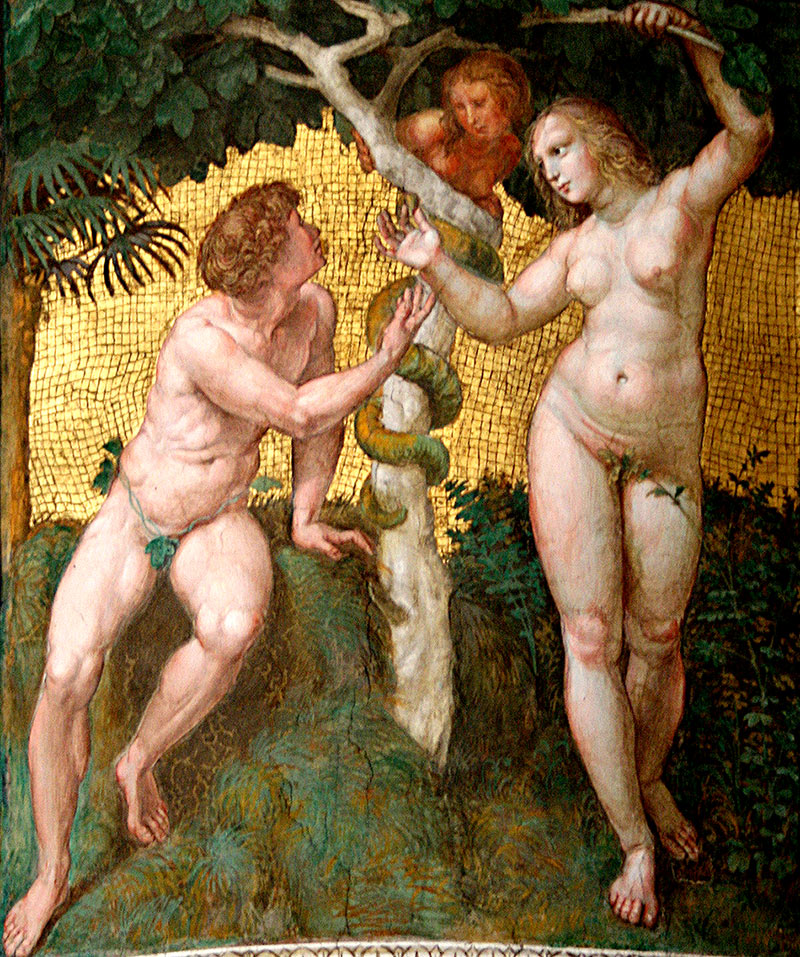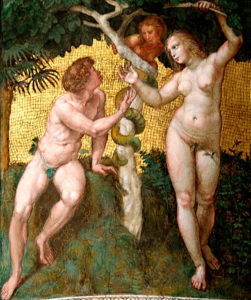Central idea: Christ’s victory over our sin. Doctrine: Man in paradise. Practical application: Foretaste of paradise.
To view Lectionary 89, click here.
Central idea: Christ’s victory over our sin.
Reading 1 Gn 3:9-15
After the man, Adam, had eaten of the tree,
the LORD God called to the man and asked him, “Where are you?”
He answered, “I heard you in the garden;
but I was afraid, because I was naked,
so I hid myself.”
Then he asked, “Who told you that you were naked?
You have eaten, then,
from the tree of which I had forbidden you to eat!”
The man replied, “The woman whom you put here with me—
she gave me fruit from the tree, and so I ate it.”
The LORD God then asked the woman,
“Why did you do such a thing?”
The woman answered, “The serpent tricked me into it, so I ate it.”Then the LORD God said to the serpent:
“Because you have done this, you shall be banned
from all the animals
and from all the wild creatures;
on your belly shall you crawl,
and dirt shall you eat
all the days of your life.
I will put enmity between you and the woman,
and between your offspring and hers;
he will strike at your head,
while you strike at his heel.”
- This is the seemingly naive but profound and mysterious divinely inspired account of the fall of man from original holiness and justice.
- God begins the redemption of fallen and wounded man by asking questions.
- He does not ask questions because he does not know the answers; rather, he wants Adam and Eve (and us) to think about who we are, what we have done, and why we have done it.
- Has man done the will of God? Our Lord says in today’s Gospel reading that doing the will of God is what makes one a member of the family of God.
- At this point, Adam and Eve can only blame someone else. Adam blames Eve. Eve blames the serpent.
- Notice that God does not ask the serpent why he has tricked Eve with his lie. Satan is irreformable, but man is not, so long as his earthly life continues.
- The account of the fall also includes the promise of salvation.
- The protoevangelium, or first announcement of the Gospel, is the prophesy of the “woman,” Mary, the New Eve, and ‘her offspring,” Christ, the New Adam, who will over come Satan (CCC 410-412).
Responsorial Psalm Ps 130:1-2, 3-4, 5-6, 7-8
R. With the Lord there is mercy, and fullness of redemption.
Out of the depths I cry to you, O LORD;
LORD, hear my voice!
Let your ears be attentive
to my voice in supplication.If you, O LORD, mark iniquities,
LORD, who can stand?
But with you is forgiveness,
that you may be revered.I trust in the LORD;
my soul trusts in his word.
More than sentinels wait for the dawn,
let Israel wait for the LORD.For with the LORD is kindness
and with him is plenteous redemption
and he will redeem Israel
from all their iniquities.
- Because God is merciful, kind, forgiving, and attentive to man, all man has to do when he sins is to turn back to God, to repent.
- Man needs to trust God, to trust that God really is this kind of good person.
- One of the basic forms of prayer is reparation, saying sorry to God for the evil we have done and the evil everyone else has done.
Reading 2 2 Cor 4:13—5:1
Brothers and sisters:
Since we have the same spirit of faith,
according to what is written, I believed, therefore I spoke,
we too believe and therefore we speak,
knowing that the one who raised the Lord Jesus
will raise us also with Jesus
and place us with you in his presence.
Everything indeed is for you,
so that the grace bestowed in abundance on more and more people
may cause the thanksgiving to overflow for the glory of God.
Therefore, we are not discouraged;
rather, although our outer self is wasting away,
our inner self is being renewed day by day.
For this momentary light affliction
is producing for us an eternal weight of glory
beyond all comparison,
as we look not to what is seen but to what is unseen;
for what is seen is transitory, but what is unseen is eternal.
For we know that if our earthly dwelling, a tent,
should be destroyed,
we have a building from God,
a dwelling not made with hands, eternal in heaven.
- This life is a time of trial and tribulation, despite all the goodness and all the kinds of happiness we also experience.
- What is good about the Gospel, which means good tidings, is the promise of our own resurrection and the fullness of eternal life, along with the possession of “everything” good (“Everything indeed is for you”).
Alleluia Jn 12:31b-32
Now the ruler of the world will be driven out, says the Lord;
and when I am lifted up from the earth, I will draw everyone to myself.
- The scribes made the claim that Satan, “By the prince of demons he drives out demons.”
- But there is enmity between Christ and Satan: “he will strike at your head, while you strike at his heel.
- Satan, this “ruler of the world,” no longer has any power over us, unless we give it to him.
- We can all be drawn to Christ, instead, if we will allow ourselves to be drawn.
Gospel Mk 3:20-35
Jesus came home with his disciples.
Again the crowd gathered,
making it impossible for them even to eat.
When his relatives heard of this they set out to seize him,
for they said, “He is out of his mind.”
The scribes who had come from Jerusalem said,
“He is possessed by Beelzebul,”
and “By the prince of demons he drives out demons.”Summoning them, he began to speak to them in parables,
“How can Satan drive out Satan?
If a kingdom is divided against itself,
that kingdom cannot stand.
And if a house is divided against itself,
that house will not be able to stand.
And if Satan has risen up against himself
and is divided, he cannot stand;
that is the end of him.
But no one can enter a strong man’s house to plunder his property
unless he first ties up the strong man.
Then he can plunder the house.
Amen, I say to you,
all sins and all blasphemies that people utter will be
forgiven them.
But whoever blasphemes against the Holy Spirit
will never have forgiveness,
but is guilty of an everlasting sin.”
For they had said, “He has an unclean spirit.”His mother and his brothers arrived.
Standing outside they sent word to him and called him.
A crowd seated around him told him,
“Your mother and your brothers and your sisters
are outside asking for you.”
But he said to them in reply,
“Who are my mother and my brothers?”
And looking around at those seated in the circle he said,
“Here are my mother and my brothers.
For whoever does the will of God
is my brother and sister and mother.”
- Returning to his hometown, Our Lord and his disciples encounter three groups: the thick crowd of onlookers, the scribes who said he was demonic, and his family who thought he was insane.
- It was unusual for Christ to defend himself before men. But here he first uses reason to show the absurdity of attributing his preaching and miracles to Satan. Then, Our Lord teaches that his true family consists of those who do the will of God.
- On the surface, this looks like a rejection of Jesus’ immediate family, but we know that no one did the will of God like his mother Mary. And Christ’s cousin (brother) James would become the leader of the Church in Jerusalem.
Doctrine: Man in paradise
- Adam and Eve were created in the original condition of holiness and justice (CCC 375).
- Original holiness was “friendship with his Creator,” based on sharing “divine life” (CCC 374-375).
- Original justice was the harmony that existed “with himself [, with Eve,] and with the creation around him” (CCC 374, 376).
- “As long as he remained in the divine intimacy, man would not have to suffer or die” (CCC 376).
- In addition, work was a blessing without the element of toil it would later acquire (CCC 378).
- In this condition, man had “mastery” not just over creation but primarily over himself.
- In this “mastery of self” man was free of the concupiscences all of us experience in this life: “the triple concupiscence that subjugates him to the pleasures of the senses, covetousness for earthly goods, and self-assertion, contrary to the dictates of reason” (CCC 377).
Practical application: Foretaste of paradise
- In heaven, if we make it there, we will be in a state in Christ’s new creation in which we will not only regain but surpass Adam’s original friendship with God, his original sharing in His life, and Adam’s original harmony within himself, with other persons, and with creation (CCC 374).
- Yet even now we can re-taste original holiness and justice and anticipate this final “surpassed” condition.
- Friendship with God, internal peace and harmony, friendship with all men, and mastery of creation are consequence of living the Catholic faith.
- Heaven really does begin on earth for those who cooperate with the grace God lavishes upon us: it is for “whoever does the will of God.”
The Homiletic Directory recommends the following Catechism points and themes for the Tenth Sunday in Ordinary Time:
- CCC 410-412: the Protoevangelium
- CCC 374-379: man in paradise
- CCC 385-409: the fall
- CCC 517, 550: Christ as exorcist


Leave a Reply